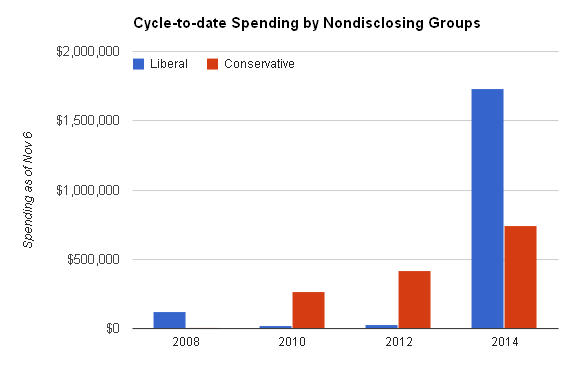When the Citizens United case was decided by the Supreme Court, a howl went up from Democratic politicians. “Take the money out of politics,” they said. “This will open the floodgates for corporations to buy elections.”
I have posted charts from opensecrets.org before. These charts show that the top spenders (before and after Citizens United) are still the unions. No one is talking about taking away the right of unions to donate to campaigns. Also, keep in mind that the people who pay union dues and provide the money for the donations don’t have a say in where the money is donated. At least the leaders of a corporation that donates to a PAC are accountable to their stockholders. The fact that government employee unions give political donations is also a bit questionable–they donate to the people they are going to negotiate contracts with. Is it possible to do that without a conflict of interest?
Any, here is one of the charts from opensecrets.org:
 So why am I mentioning this? First of all, I firmly believe that what is good for the goose is good for the gander. If unions are allowed to make campaign donations, corporations should also be allowed to make campaign donations. If you want to eliminate one, take them both away. Otherwise, you are creating an unbalanced situation where the government is suppressing free speech.
So why am I mentioning this? First of all, I firmly believe that what is good for the goose is good for the gander. If unions are allowed to make campaign donations, corporations should also be allowed to make campaign donations. If you want to eliminate one, take them both away. Otherwise, you are creating an unbalanced situation where the government is suppressing free speech.
The National Review is reporting today that according to the Hillary Clinton emails, Mrs. Clinton was planning to reverse the Supreme Court ruling on Citizens United as soon as possible.
The article reports:
Although President Obama came out swinging against the decision during his State of the Union address a few day later — prompting some Justices to boycott future speeches — Clinton remained largely silent on the issue for years. She didn’t openly declare her opposition to Citizens United until April 2015, after she’d already announced her candidacy. In May, she said she’d use opposition to Citizens United as a litmus test for any Supreme Court nominee.
The Ready for Hillary Super PAC — founded under the new Citizens United rules — raised $15 million for the Clinton campaign before it was disbanded early this summer following her presidential announcement.
Mrs. Clinton’s emails to Sidney Blumenthal show a desire to overturn the Citizens United decision, yet she was willing to take advantage of the law up until the time she ran for President. She disbanded the PAC before any low-information voters would learn about it. Also, there is the question of the money flowing through the Clinton Foundation that might have made the PAC unnecessary. Remember that most of the Clintons travel expenses are paid through the Foundation, and a large part of campaigning is travel. That may or may not be illegal, but it is questionable at best. The hypocrisy is amazing.






